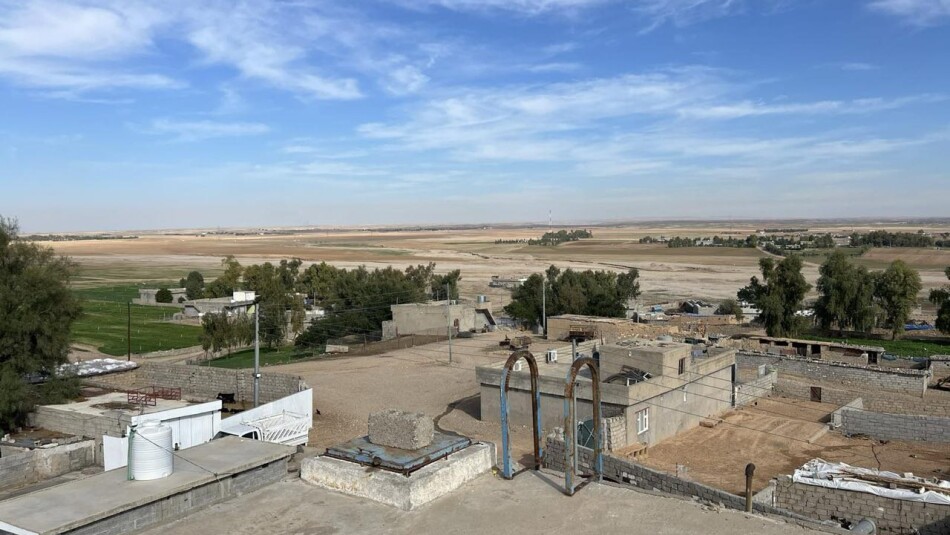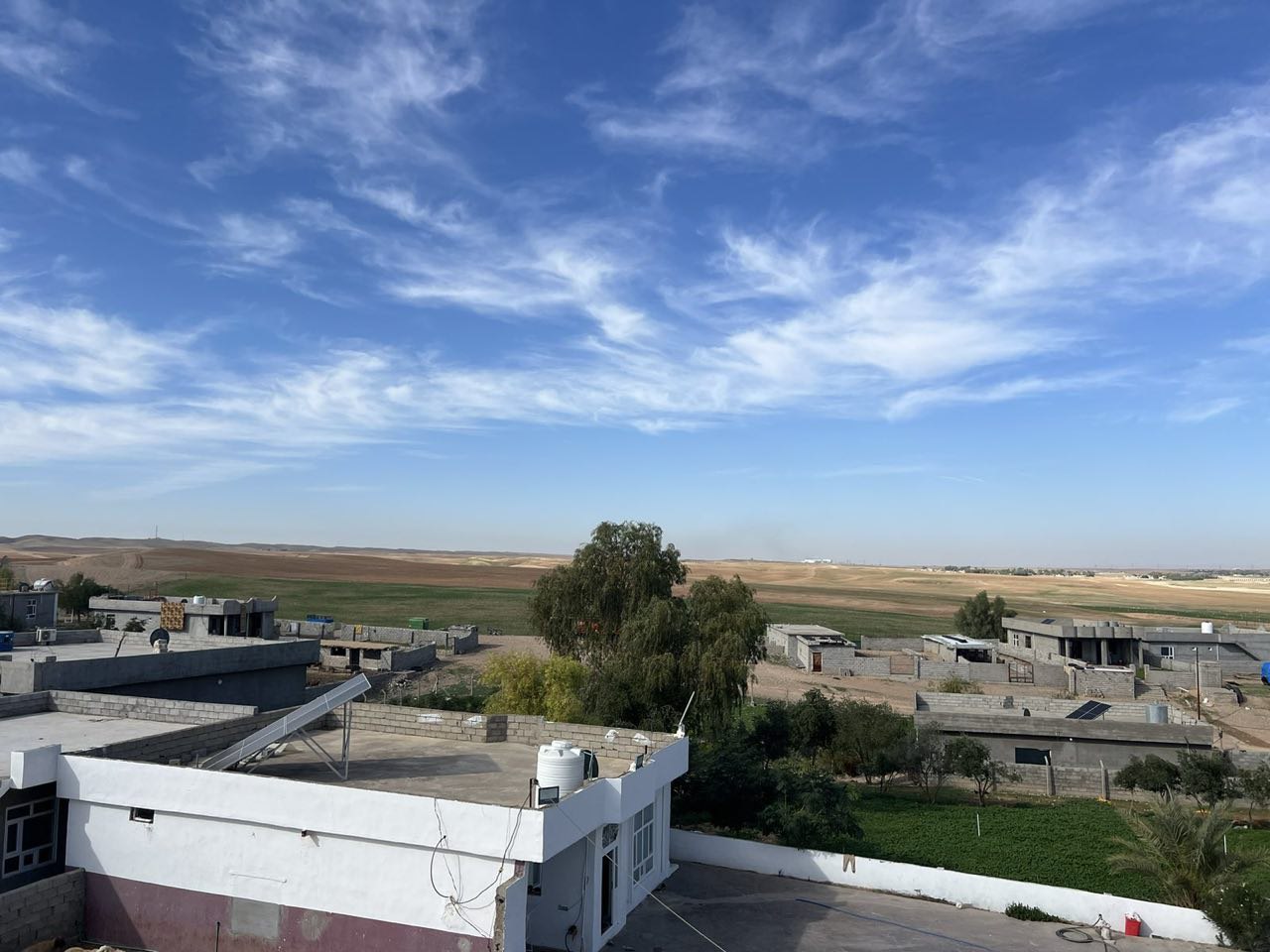
It is possible to fight cancer and pollution at the same time. The women of the village of "Awlaqut " in Kifri District, Garmiyan Administration under Sulaymaniyah Northern Province decided to ban the throwing or burning of plastic waste in their village, which until a year ago was considered a source of pollution of water resources and the reason behind the spread of diseases.
The village of "Awlaqut " is 13 km away from the center of the Sarqala sub-district, Kifri District. The village is now free of plastic waste after an initiative launched by a group of women from the village to reduce the throwing of plastic waste.
Before this initiative, the waste was spread throughout the village and its peripheries. The smoke emitted from burning it polluted the air in the area or accumulated at water sources, according to Fatima Muhammad, one of the women participating in the plastic waste collection initiative.
Awlaqut is a relatively densely populated village in the area, home to 120 families with around 500 people.
"For years, we did not know what damage was caused by throwing plastic waste. Pots, containers and other household items were scattered around the village and mixed with the soil, or the rising smoke was annoying and disturbing the villagers," Mohammed says.
The idea of collecting plastic waste came to Mohammed after she and one of her husband’s sisters were diagnosed with cancer two years ago. They are currently receiving treatment at the Hiwa Cancer Hospital in Sulaymaniyah.
The doctors told us that the reason for our illness was due to inhaling air polluted by smoke and advised us not to live in an area with polluted air
Fatima says, "The doctors told us that the reason for our illness was due to inhaling air polluted by smoke and advised us not to live in an area with polluted air."
Plastic is a material that does not decompose in the environment and "some of its components disintegrate and mix with environmental components due to climate change and rising temperatures, which affects human health and exposes people to cancer, in addition to other damage to other living organisms and water."
According to the Ministry of Health MOH of the Kurdistan Regional Government KRG, environmental pollution is one of the causes of cancer, with nine thousand and 911 cases recorded in 2023, and statistics indicate that lung cancer is the second most common case.
Awlaqut beyond municipal services
The Garmiyan administration consists of three districts, including no less than 375 villages, the amount of waste collected daily in the district centers and villages near the main roads in Garmiyan reaches 400 tons.
The village of Awlaqut is not among the villages covered by waste collection services by the municipality, this task is undertaken by Fatima and other women in the village.
Fatima says, "On most days, after breakfast, I start collecting plastic waste and then sell it. Although its income is small, what matters to us is getting rid of plastic waste."
Of the 375 villages in Garmiyan, 50, including Awlaqut, have seasonal water sources that flow into the Sirwan River.
Before the launch of this initiative, plastic waste was mixed with the water of streams and springs that flow into the Sirwan River.
Nawzad Hamid, the Director of Water for the Garmiyan Outskirts, said that "one of the main reasons for the pollution of water sources is the plastic waste that some villagers throw into the water of streams and springs, and this causes health damage to the residents and neighborhoods living in the river or in the groundwater."
The Sirwan River is one of the main sources of drinking water for the residents of Kalar District and its outskirts, and it also supplies fish ponds, agricultural fields and livestock.
Unscientific methods for waste management
Waste in all of Iraq and Garmiyan is not collected scientifically, so it is not recycled for use, and the methods used to dispose of it are also unscientific.
Barzan Faeq, the head of the Supreme Committee for Waste Collection in the Garmiyan Administration, explained that a large percentage of the 400 tons of waste collected daily in Garmiyan is plastic waste, "but due to the lack of waste sorting, its percentage cannot be accurately determined."
"We do not have recycling or environmental instructions regarding the sorting of plastic waste from other waste, but we bury it in the Kharshit area near the village of Girda Gozineh," Faeq said and this is the only method used to dispose of Garmiyan waste.
But Hamid pointed out that "the mixing of village waste with the water of the Sirwan River needs a solution." Everyone stresses that burning or burying waste is not a scientific solution.

Plastic affects the fertilization process, hormonal activities and the brain. Burning plastic waste also pollutes the air, according to warnings from the United Nations. Statistics of the UN indicate that more than 400 million tons of plastic waste are produced annually in the world, half of it is suitable for single use and less than 10% of it is recycled and reused.
Dr. Ali Masoud, an ear, nose and throat specialist at Kalar General Hospital, says that "burning waste and plastic, especially detergent and pesticide containers near residential areas poses a danger to the lives of citizens."
Inhaling the smoke of burning plastic waste and the unpleasant odors …. increases the chances of developing skin, throat, nose, asthma and intestinal inflammation diseases
"Inhaling the smoke of burning plastic waste and the unpleasant odors emanating from the waste that becomes a hotbed for rodents, worms and flies increases the chances of developing skin, throat, nose, asthma and intestinal inflammation diseases," he added.
"This pollution is a major cause of cancer and the spread of the toxoplasma germ, which leads to miscarriage."
The initiative of Awlaqut could not spread beyond the village yet still it is the first local intiative by women for a plastic free zone.
"I sell 20 kilograms of plastic once every two months. The amount we get is small, but the important thing is that we are safe from smoke and diseases," Fatima says.
Pakhshan Abdullah (35 years old), another woman living in the village of Awlaqut, said, "We have been collecting plastic waste for about two years. We keep our environment and our village clean."
All plastic materials are very harmful to health and the environment because they are made from hydrocarbons, meaning that their main component is oil.
Abdullah, a mother of seven children, suffered from severe shortness of breath before the initiative was launched and the doctor advised her to avoid breathing polluted air. Since then, she has not allowed waste to be burned in her village.
She collects and sells seven kilograms of plastic waste every week.
Kochar Yassin (32 years old), visits Awlaqut village weekly with a caravan to collect plastic waste from the women and children of the village.
Yassin said Awlaqut villagers accumulate about 142 kilograms of plastic waste every week, and he buys one kilogram for 200 Iraqi dinars IQD (USD0,4).
“Among the villages I visit, Awlaqut collects the largest quantity of plastic, and it is the first village where all the women and children collect plastic."
Yassin transports the plastic to a factory to grind plastic to sell it, and from there the ground plastic is sent to other provinces.
There is a small plastic recycling factory in the middle of the Kafri district, where 50 kilograms of plastic waste are ground and melted daily, and some supplies are made from it, such as chairs and tables, but the factory is unable to deal with the large quantities of plastic collected in Garmiyan.
"All plastic materials are very harmful to health and the environment because they are made from hydrocarbons, meaning that their main component is oil, and heavy metals such as nickel and lead are mixed with them to give the plastic the necessary strength and flexibility," Raafat, the environmental expert in Garmiyan, says
Traditional plastic production consumes 4-6% of the total global production of crude oil annually.
He pointed out that "throwing plastic waste into water sources and the environment leads to pollution, because the main components of plastic will lead to changing the quality of water."
"We must work to reduce the use of plastic, which is one of the biggest threats to the environment and humans all over the world, and it may completely affect the world's environment during the next century if it is not treated."
Women are not the only ones who collect waste in the village of Awlaqut, Fatima Muhammad affirmed. "We also taught our children to collect plastic waste and not throw it away."